#only virtuous behavior in fiction!!!!!
Explore tagged Tumblr posts
Text
why are ppl getting mad at incest in a fictional roman empire universe
are you guys new to earth or smth
#text#you puriteens are so boring#fiction isn’t real hope it helps#y’all will just willingly backslide yourselves into conservative viewpoints and it’s so?????#no more sex in fiction!!!!!#only virtuous behavior in fiction!!!!!#take all fiction literally!!!!!#y’all complain abt the election results when this sort of thinking is v much part of the cultural shift that allowed it to happen#all of this to say i will now be shipping geta and caracalla from the new gladiator movie out of spite#it’s not even a spoiler for the movie#there’s no incest in it#it’s literally just ppl being mad at like one person who made one fanart abt it
15 notes
·
View notes
Note
I recently saw someone describe Laios as (paraphrasing here): “the poster boy for racist white autistics who think being autistic excuses their racism.” Your thoughts on this hot take?
Ok, so, one of the things that makes Dungeon Meshi really good is that it takes the idea of fantasy races and actually explores it with the depth that you find in real world race relations, and one of the ways that manifests is that all the characters, no matter how virtuous or well-intentioned they are, have absorbed at least some of the prejudices of their time and culture regarding other races. Or, to put it more simply, all the characters are at least a little bit racist, in the way that real people are all a little bit racist. Because society itself has bigotries and prejudices built into it, and if you're born into society - whether it's a fictional one or the real world - you're going to internalize some of those prejudices without meaning to.
Laios is definitely a little bit racist - not in a cruel way, and never intentionally, but he's lived a somewhat sheltered life and has some preconceptions about other people that are incorrect. It's part of his whole beef with Shuro - the little microaggressions, the careless way he asks prying questions about Shuro's culture, the fact that Shuro's name is actually Toshiro but Laios keeps calling him by a mangled version of that name without realizing it, it's all, yes, a little racist.
The part of that statement I'd take issue with, though, is the "excuses their racism" part, because Laios doesn't try to excuse his fuck ups. Like, take the Shuro example - when Shuro finally explains why he hates Laios, Laios is angry that Shuro didn't tell him what was wrong earlier. Laios immediately accepts that he fucked up, and is only angry because if he had been told earlier what he was doing, he could try to change his behavior.
Laios is a xenophile - he loves anything that is different than him, because it's different from him, and he finds those differences cool. It makes him very keen to learn and improve himself in turn, and so his reaction when people bring up his faults is to always try and figure out how to improve upon them and make up for his mistakes. This includes his blunders with people. He doesn't make excuses, he doesn't pretend he doesn't need to change or that he never fucks up. He always, always wants to learn and do better.
46 notes
·
View notes
Text
Itachi would've been fine to me tbh if like the story just let him be humbled lol. The main issue is that nobody called out Itachi for his actions, except for Itachi himself, which ironically serves to make him seem even more virtuous and flawless. "I understand feeling upset when some people in the fandom community don't use critical thinking. However, imagine investing a lot of time following a story you read since you were a kid. Many people simply follow the story as presented, and can you blame them when the story validates Itachi? I can't really blame them that much when even the writer seems to be bending over backwards to portray the character as a well-meaning hero, like in the case of Itachi." Now, I don't really know how well something like reading a piece of Naruto media can translate to real life but the saying the things we read and watch can influence on how we perceive the world rings true in my opinion because unfortunately some people really do believe in the Uchiha curse b.s and to me reflects a lot when it comes to how marginalized groups are stigmatized like the idea of a group having the curse of hatred inside of them is fucked if you are so set to believe in something based on a fictional group in a piece of media well... it raises questions about how that might influence real-life beliefs and attitudes towards marginalized groups
I think it's important to be at an age where you have developed critical thinking skills to engage with complex narratives like this. Many people are influenced by nostalgia and are such huge fans of certain characters that they are inclined to make elaborate analyses justifying their actions. For example, some might argue that because Itachi was just a kid when he committed certain acts, it excuses his behavior. However, if we start using age or other factors as excuses for heinous actions, where do we draw the line? What other circumstances would you be willing to bend over backwards to justify committing heinous crimes similar to what Itachi did?
Naruto is a bitch. I don't really want to extend to much with this character since I just feel disappointment. I wanted him to do more then he failed. He's become a politician I don't know what else to say lol. So many people say he inspired them how? What did he accomplish besides obtaining Hokage their world is still fucked up man the shinobi system still rotten. I thought this kid would grow up to do something about it but he remained complacent and changed nothing only difference is he's on top. I realized about later that was Sasuke role as an antagonist and it wouldn't make much sense lol there need to being 2 opposing sides but yeah... He was a whole lotta nothing as a protagonist he was cute kid but he grew up to be a dumb fuck who can't figure out why his "dearest friend" is siding against him and became man who can't keep promises.
It makes sense he had a hunger for acknowledgement I'm not discrediting that since he was a child but he wanted validation from everyone that he has such an obsession with his own self-image and how everyone thinks of him that I find it portrayal to be unhealthy. Sasuke at the end was just a checklist a reward at the end of the day that he wanted to gain for his personal goal.
Naruto talk no jutsu is so manipulative to me sometimes that instead of directly confronting Sasuke's ideas or opinions as equals would in a debate or discussion he would indirectly undermined them. He did this by ignoring Sasuke's valid arguments and instead focusing on exploiting Sasuke's emotional vulnerability, particularly his feelings of loneliness and despair stemming from the loss of family. Like his approach to me suggests a tactic to manipulate Sasuke's emotions rather than engaging with his ideas or concerns directly. But, I ain't sure if he's doing this deliberately since I don't know if he's that smart or I'm looking to much closely.
I'd rather ship his character with fucking OC's. I feel like each member of Team 7 are obsessed and want something from the guy but they don't care for Sasuke personally because if they did it would show but they're after him for what they want from him as a goalpost and hey they won.
42 notes
·
View notes
Text
idk how to phrase this but like. people retroactively calling Fleabag a privileged, dissociative portrayal of feminism which is Bad, Actually, are lowkey deranged to me because, yeah, Fleabag IS about the expierience of womanhood. but like. through the lens of ONE woman? like, nowhere in the show is it ever implied that fleabag's expieriences are supposed to be universal, relateable core pillars to womanhood?
its almost like half of the population of the world is female and I think it's kind of weird that all stories about women always have to be feminist and activist, and can not just be an exploration of an imperfect woman, they have to be correct about *all* of womanhood?
i also think that the people saying this don't really understand the character of fleabag and i do think that the show is feminist in many ways, but even when no person working on this show would have had any intention of making this a "feminist story", i think that would have been their right to do that?
breaking bad, fight club, american psycho, lolita, etc. all tell the stories of white men who are objectively horrible people. and these stories still treat these characters with a level of empathy and understanding of how they got there and why they are like that. the stories don't excuse their behavior because of that, they are simply a fictional analysis of a person who is not virtuous or good in a lot of ways.
but women, people of color, disabled people, and other minorities are never given the same right to just tell a story about a character, the character has to be virtuous, a good role model, a representation of their whole group, likeable, flawed only in an "unproblematic" way, never make a bad decision, and its insanely limiting in what stories can be told by writers, when they want the approval of the general audience
and i so genuinely want more fleabag women, who may interact with feminism, but who are actual human beings in a real world, who have real flaws and who can be selfish and cruel, but who are still treated with empathy by the story
#myposts#anyways fleabag my beloved#like this 'fleabag is a bad feminist' yeah so? she says that as one of the first lines in the show#like does that make the show bad or what lmao#and like i LOVE the 'we're bad feminists' scene bc#like this woman asks who in the audience would give up time of their lifespan to have an ideal body#and only fleabag and claire raise their hands but genuinely you cannot tell me that no one else in the entire rest of the audience#would want that. like the woman in the front asks for a reason and that reason is that a lot of women would want tha#because they are socialized to be concious about being attractive and desirable and fleabag and claire are being honest#im not saying ALL other women in the audience lied but some probably did. right?#because they actually do want to look like 'good feminists' who are wholly unaffected by living in a patriarcal society#do i make sense? idk
52 notes
·
View notes
Text
“Viv makes suicide jokes!?! She must not care about suicidal people!!! If one of her fans killed themselves she wouldn’t care!!! Remember Shay!?” Have you considered joining the Olympics cus that was a fucking mental leap of insane skill.
Viv ain’t our fucking mother, the fact antis want her to be so makes me wonder if they have negligent parents cuz hoo boy, I’m sensing some projection here.
I’m sorry if your parents don’t love you but that’s not our problem now is it?
Also these people need to realize the KYS jokes on the merch is literally a fucking joke because the shirts were being sold at an Anti-Blitzo party. Don’t fucking tell me you fucking jackasses wouldn’t buy any of those damn shirts if you had the opportunity to do so without giving Viv money. You fuckers hate every fucking character anyway, Blitzo included. These people would absolutely buy Viv KYS shirts or something.
You’re full of shit and I respect none of you.
“KYS jokes are bad!!!” “Some other anti tells a fan to KYS cus you fuckers are fucking morally reprehensible”“total silence from every other anti on this site.”
Like please, some of you fucking mental cases act like if Viv offed herself y’all would fucking celebrate, hypocrite-ass bitches.
You can’t “care” about suicide when you involve yourself with a group of people who have no moral qualms with telling others to off themselves over fictional bullshit, what a fucking tool you have to be to not realize how toxic the anti mentality really is.
Like what happened with Shay was horrible but antis sure af ain’t any better.
It’s not like Viv could really do anything beyond wag her finger at us and tell us to knock it off anyway, there’s only so much she can do after the deed has been done, like sorry she didn’t personally do anything about it before Shay went to the other side but she’s a busy woman, she don’t got time to babysit us like we’re 4.
Even if she did, y’all would still find ways to bitch about it. We all know you want the bitch gone from the internet, whether it be by force, her choice, or her death, y’all don’t fucking care.
Morally reprehensible vermin the lot of you. Dressing your repugnant behavior as virtuous is far more disgusting to me than anything Viv has ever done.
2 notes
·
View notes
Text
Thinking about the implications of a female character created to support a man’s story, a secondary character who appears only in (what appears to be) a retelling of some tale. Who probably never existed even within the overarching story’s fictional world. Who was probably just created by one (fictional) man to explain another (fictional) man’s poor behavior. A girl who is young and pretty and at first seems independent, but soon becomes completely dependent on the man who swept her off her feet. And then an unmarried housewife. Who participates in events around the town until it gets too hard without her “husband” around (he never planned to be around). Who gets lonely and cries when she thinks no one is looking, and there might as well be no one looking because no one steps in until she’s at the window and her house is covered in weeds and the rain floods the ground into a swamp and she can’t reach him and he can’t reach her. A young girl who lost her parents an unspecified “long time” ago, who probably misses them and who may have gone without a father figure for some of her formative years, and maybe that’s why she was so eager to move in with a man twice her age, but it doesn’t matter because she wasn’t given that depth and she was never going to be given that depth. And probably none of that ever happened anyway. She’s a girl with no agency at all, not even over her own existence.
Thinking about the implications of taking this girl, this character, and giving her some agency. Turning her into the first character of a story within a story to be proven real. To have physical proof of her existence, to be given flesh and blood, and, most importantly, to have the power to tell her own story. But it’s the same story, more or less. Though this time, she gets to make the move on a man who’s only 10 years her senior, not 20. And he gets to be the virtuous hero who refuses her, the temptress. And her heart still gets broken, but she’s the one breaking it. And it’s almost silly, the way she pined after this man who only ever saw her as a child. Until you find out how it happened before. But it’s her story this time, and she’s the one telling it. It’s her poor decision, and she gets out mostly unscathed. But she’s not the hero, and she’s not telling the story for herself. It’s a story told to another man to explain another man’s character. It’s her story, and she’s the one telling it, but it’s not about her.
Thinking about what it might mean, if it means anything, to take her and reimagine her once again. To keep the love story (if that’s what it is) but get rid of the age gap, and make them high school sweethearts. So she gets introduced by name early on, and gets left early on. So everyone knows she’s one to pay attention to. And she’ll get to tell her story later, but not until the end. Before then, she becomes a looming figure. A name on a slip of paper. A name that’s the source of conflict, the central conflict that builds throughout the story. She’s almost the antagonist, except it’s not her, just her name and what it could mean. And she still gets to tell her story, and it’s still really about the men, etc. etc. And it’s the same story, for the most part.
Thinking about agency and storytelling. About who gets to tell their story and who doesn’t. Is it worth it to have agency if it just means you’re the one who makes the big mistakes? Is it even really your agency if that was always supposed to be your story anyway, like some sort of destiny? Are you just getting blamed for it? Is it still your story if you tell it for the benefit of someone else? Is it still your story if you’re not the one telling it? What does it mean to have agency within a work of fiction? Do any of these questions even matter because it’s all fictional anyway and no one has control and everyone is created to serve The Narrative and The Protagonists? What does it mean to be a woman in fiction? What does it have to do with being a woman in real life? If you tell your story within a story, do you still have agency if there’s someone else writing the larger plot? What does it mean for a female character if the author is a man? The screenwriter is a man? The composer is a man? The director is a man?
#original post#long post#big fish#yea this is just me big fish posting again#it’s not that deep#anyway show’s been over a week haha I can stop now…..anytime now……#i didn’t say her name but she popped into your head didn’t she?<3#(willing to bet that she did not. though I guess if you read the full post maybe you did know who it’s about?)#literally this is just rambling but oh boy do I sure love saying words!!!!!!#hashtag feminism am I right haha this is. definitely literary analysis not just word vomit#I think I’m autistic
2 notes
·
View notes
Text
Bakugo: The Case Against Forgiveness
Katsuki Bakugo, a student with explosive powers who is known for his aggressive behavior and toxic personality. Despite his popularity among some viewers, it is important to acknowledge that Bakugo's toxic traits cannot be ignored or forgiven.
Bakugo's Toxic Traits
Bakugo is a character who is defined by his aggressive behavior and superiority complex. He constantly belittles, insults, and even physically attacks his classmates, particularly Izuku. His behavior is not only harmful to others, but also to himself, as it often leads him to make reckless decisions that put himself and his team in danger. Bakugo's inability to work well with others is a major flaw, considering that hero work often involves cooperation and communication.
Furthermore, Bakugo's toxic traits are often glorified by the show, which can send the wrong message to viewers. His violent outbursts and aggressive behavior are often portrayed as heroic and admirable, which can normalize toxic behavior for impressionable viewers. This normalization of toxic behavior is a concerning trend in media, as it can lead to real-life consequences for individuals who model their behavior after fictional characters.
The Case Against Forgiveness
Some fans argue that Bakugo's behavior can be justified by his “””traumatic past””” or his desire to be a great hero. However, these arguments do not excuse or justify his toxic behavior. While it is important to acknowledge that characters can have complex motivations, it is not enough to overlook the harm that Bakugo causes to others.
Forgiveness is often seen as a virtuous act, but it is important to remember that forgiveness requires accountability and genuine remorse. Bakugo has never taken responsibility for his behavior or shown any real regret for the harm he has caused. Instead, he continues to belittle and insult others, even after being confronted about his behavior.
Forgiving Bakugo would not only be harmful to the other characters in the show, but also to viewers who have experienced toxic behavior in their own lives. It sends the message that toxic behavior can be excused or forgotten, which can have real-life consequences for individuals who have been harmed by toxic people.
Conclusion
In conclusion, Bakugo's toxic behavior is a major flaw that cannot be ignored or forgiven. His aggressive behavior, superiority complex, and inability to work well with others make him a toxic character that glorifies harmful behavior. It is important to hold characters like Bakugo accountable for their actions and send the message that toxic behavior will not be tolerated or excused.
102 notes
·
View notes
Text
I saw a post a day or three back (I’m not going to look for it) that said that “it’s only wrong if it hurts people” is a trivial proposition because it just moves moral disagreement back to disagreements about what hurts people. I think there’s some truth to that, but I think that also underestimates how revolutionary and radical “it’s only wrong if it hurts people” actually is.
There are a number of very common/popular conceptions of morality that don’t fundamentally reduce to “it’s only wrong if it hurts people”:
- Command morality: morality consists of obeying a Proper Authority, an act is good if the Proper Authority approves of it, an act is bad if the Proper Authority forbids it. An example of command morality is (certain common forms of) Christianity: in Christianity the Proper Authority is God, an act is good if God approves of it, and an act is bad if God forbids it. In other forms of command morality the Proper Authorities are often high-status humans within your community such as elders, kings, etc. (in Christian societies command morality-based obedience to high-status humans often exists under some sort of “God’s deputy” theory). At its crudest, command morality is the reduction of morality to pure social status; to be morally good is simply to obey and submit to the higher-status people in your community. There’s often some idea that the Proper Authorities don’t or shouldn’t want you to hurt people, but not hurting people is at most fundamentally tangential to command morality. Under command morality, randomly killing your own son is morally good if a Proper Authority commands you to do it (this is a common and face value interpretation of the story of Abraham and Isaac).
- Deontological morality: morality consists of obeying a series of rules. These usually include rules against hurting people, but they also often include other rules tangential or orthogonal to not hurting people which are given equal or greater weight. A famous (apocryphal?) example is the Kantian idea that you should tell a murderer that their intended victim is hiding in your home because in that situation that particular variant of deontology prioritizes the rule against lying over the rule against harm.
- Spiritual cultivation: good is defined as attaining some enlightened spiritual state. Attaining this state often involves some forms of non-violence and other pro-social behavior, but not hurting people is fundamentally tangential to this notion of good. Buddhism and the more mystical/transcendentalist branches of Hinduism as I understand them are this, and I think much of the Christianity and Islam that isn’t command morality is basically this (like, this seems like basically what Christian monks and Muslim sufis are often trying to do).
- Virtue-based morality: good is embodying virtues. I think a lot of the time at a cognitive level the virtue moralist is trying to embody a particular mental picture of a good person (which, to be clear, I consider a legitimate project). Virtue moralists are often trying to embody virtues that involve not hurting people (kindness, fairness, noblesse oblige, etc.), but they may also be trying to embody virtues fundamentally tangential or orthogonal to not hurting people (excellence, bravery, martial prowess, etc.), and they may prioritize the latter over the former. Virtue-based morality also has a tendency to prioritize using virtuous means over actually preventing harm or benefiting people (you see this conflict between virtue-based morality and consequentialism a lot in fiction and pop philosophy).
- Conformism: conforming to the social code and normative behavior of your community is good, deviating from the social code and normative behavior of your community is bad. The social code of any functional community will contain rules against hurting people and norms of pro-social behavior, but not hurting people is fundamentally tangential to conformism. Under conformism, using an insufficiently deferential word to refer to a respected elder may be punished more severely than killing your romantic rival. Under conformism, harmless eccentricities are often punished with appalling cruelty and violence.
- Community loyalty/patriotism: doing things that maintain or increase the solidarity, security, wealth, military power, prestige, etc. of your community is good, doing things that reduce the solidarity, security, wealth, military power, prestige, etc. of your community is bad. This can be kind of like “hurting people is bad,” but with very strong in-group preference; community loyalty/patriotism is the sort of value system in which something like Numbers 31 can appear as an account of a glorious victory that you would want to tell your descendants about with pride (because the massacre and enslavement of the Midianites increased the wealth and security of the Israelites; under community loyalty/patriotism that’s the sort of thing you tell your children about with a tone of “look at the huge favor we did you!”). Community loyalty/patriotism also often implies a wholehearted embrace of Molochian bargains that increase the community’s economic and military power while lowering the standard of living of most or all of its members. If a strong community looks like a dreary little empire where the women are all oppressed and pregnant half the time and the men live and breathe toxic masculinity and mostly die violently before their thirty-fifth birthday, community loyalty/patriotism will tell you to embrace that lifestyle and the values and attitudes that support it and will call you selfish and bad if you don’t want to do that. If you want to know why so much of the past was so awful, I suspect it had a lot to do with community loyalty/patriotism’s willingness to embrace Molochian bargains.
- Coolness/arete: anything that makes you look powerful and beautiful is good (cool, based), anything that makes you look weak and ugly is bad (uncool, lame, cringe). I think this is what Nietzsche meant by “master morality”? In mainstream Western society this is mostly not understood as a system of morality, but 1) it’s quite influential in certain social environments, e.g. high school, where it often functions a lot like a moral system or social code, and more generally the power of such thinking in human affairs should not be underestimated, 2) explicitly moralistic versions of it do have a considerable popularity among fascists and other Romantic right-wingers (another possible name for it that occurred to me is Romantic morality). At its crudest it’s the reduction of morality to pure status emotions: anything that makes you look high-status is good, anything that makes you look low-status is bad; I think it’s not a coincidence that this and command morality have particular reputations for being awful to low-status people.
The typical human’s morality is a dog’s breakfast of “hurting people is wrong” and most or all of these other paradigms of right conduct (because humans are clever primates, not computers, and our social behavior regulation mechanisms reflect that). More to the point, as far as I can tell, even having “it’s only wrong if it’s hurting someone” as an ideal is a pretty historically recent development and a pretty significant break from how morality has been conceptualized in most human cultures. People toss around “it’s only wrong if it hurts people” or “if it harm none, do as thou wilt” as if they’re radical and revolutionary statements because they are radical and revolutionary statements; they’re implicit rejections of much of the logic of command morality, community loyalty, conformism, etc.. There’s vast amounts of human thought that’s dismissed or undermined by “it’s only wrong if it hurts somebody,” and I’m pretty sure you can still find a lot of people who disagree with it even in principle (imagine the sort of reactions you might get if you ran “it’s only wrong if it hurts someone” by some Taliban fighters who grew up in the rural areas of Afghanistan).
The fact that a lot of people see “it’s only wrong if it hurts people” or “if it harm none, do as thou wilt” as boring trivial anodyne statements is a powerful testimony of liberalism’s immense success.
592 notes
·
View notes
Note
sometimes billy antis scare me like why are you so violint to a traumtised person is it because they dont act like how you want them to act,scared you cant tmanipulate them like you do with oter traumatised people or is it just because their trauma made them a "mean" person and not a people pleaser
The problem with fandom these days is that not much is different except for the fact that now people wield social issues as a rhetorical device to justify telling people to kill themselves over fictional characters. Years ago, people still said it. Like, they would have said “You like Billy? KYS!” but now it’s “You like that racist child abuser. KYS!” (…because they have to reduce every character into an evil archetype they have invented in their head). Some of this might stem from trauma, sure, but I think a lot more of it stems from entitlement and a desire to be seen as virtuous despite they themselves saying and doing awful things to real people.
They reinforce this behavior in others, too, like a cult by controlling how people interact in fandom and making other fans too afraid to talk about certain characters without being ostracized. They don’t care about the complexities of characters and their narratives. They do not care about trauma or the social issues that come from them. They only care about their perceived virtue, which is similar to how abusers operate and maintain their power. I am a mean person. I’m not a people pleaser. My trauma has made me care less what people think of me, because this has helped me survive. These people, however, care very much that people only perceive them as good / righteous.
19 notes
·
View notes
Note
First of all, I responded to what themattress said already and when I told them I wasn't going to entertain their gross arguments further, not only did they continue to try and argue with me through other people's reblogs after I blocked them, but now they're sending other people to argue with me. Unbelievable.
What is it that you hope to accomplish here? Because you are utterly failing to convince me that you aren't an abuse apologist, since you continue to use abuse apologist arguments. And now you come here to harass me and others, a real person, long after the original person I was speaking to was blocked and reported, to...what? Defend a fictional character? Can you see how this does not help convince me that you understand or have empathy for real people, let alone abused kids. Unless of course they're your pet fictional blorbo who you can idealize..
Also, it's hilarious that you would talk about ad hominim attacks and strawman, since that seems to be all your friend is capable of. I reacted to what they said, and what they said was blatant abuse apologism. I don't care what you think about my "case" because I am not on trial and you are not my judge. I disengaged from this argument and you and your friend are trying to continue it. I suggest you go home and shut up and stop harassing people over fictional characters.
The problem with your arguments here is that you are trying to argue that something that didn't happen or wasn't shown to happen is evidence of a negative relationship between the characters. Since Iroh and Azula are fictional characters, you cannot make the argument that Iroh didn't care about Azula just because we aren't told a lot about their relationship. And the few things we do have about how Iroh felt about Azula before she tried to kill him are actually positive, like the fact that he got her a doll. You can't just dismiss what we are shown and then claim that something we aren't shown is evidence of something else. That's not how stories work. And yes, because it is a story, it also means that what we aren't shown can be assumed to be consistent with the established characterization. Characters do not do anything offscreen that contradicts their established characterization, because fictional characters only do what they are written to do. So yeah, how Iroh and Azula act around other people are absolutely indicators of how they would treat each other, given the evidence we do have. And even after Azula repeatedly tried to kill Iroh and Zuko, we actually do have evidence that he cared about her from other source materials, like when he says in "The Search" that she thinks Azula going with Zuko to find their mother might be good for her. That shows he does care about her. There is nothing in post canon materials to prove a lack of caring, since we hardly get anything at all. And again, fictional characters do not do anything they are not written to do, especially if it contradicts their established characterization. If a writer wanted to show that a character who is established to be kind or virtuous had some blind spots, it would have to be established in some way.
It is not shown or established that Iroh thinks of Azula as mini Ozai. Where does this happen? I need quotes or transcripts or specific actions, because it didn't happen. I also need textual evidence that his gift was "tone-deaf." Deaf to what, that Azula was a cruel child who was mimicking her abuser and loved to burn things, and also hated Iroh for being "kooky"? Because that is what the point of that scene is and why it is there in the narrative, not to show that Iroh does not understand Azula.
We know that Azula abused Zuko even though a lot of it is subtle because of the pattern of her behavior towards him, the way he reacts, the general pattern of Azula's behavior, the fact that we know her abuser groomed her to participate in Zuko's abuse, and the fact that Azula treats others in similar ways and generally considers herself superior to others and is cruel towards those she considers inferior. These are all things we are shown in the text that elevate her behavior towards him from just dysfunctional sibling banter to abuse. Context is important here just as it is when assessing Iroh's character and his relationship to Azula.
Context is important, and you cannot "acknowledge" anything that didn't actually happen, and neither does the rest of the fandom, since most of us interpret things based on what is actually presented in the story, not bizarre headcanons from people who insist on harassing others and don't know when they aren't wanted.
Also, on power dynamics, the problem with using Azula's age as a reason why other people have to be responsible for her is that in-story, Azula actually has a lot more power than Iroh, and a willingness to use that power to hurt others, whereas Iroh obviously does not want to hurt Azula. But he's frequently put into a position where he has to protect Zuko from her, and so was Ursa. In that context, it is not just about Azula, it is about the other child Azula is putting in danger, and everyone else she's putting in danger. Normal adults do not enable children to hurt other children. And Azula even as a young child shows a desire to hurt others, is a powerful firebender, and is encouraged and enabled to hurt others by her powerful father.
Also? Abuse often happens even in the midst of the best well-meaning adults, and it's shitty to assume that the reason it happened is because the adults didn't care enough. Sometimes that is the case, but it just isn't here, and you do not have a right to insist on this as a universal truth, and doing so actually does a lot more harm than good in recognizing how to prevent abuse in the real world, and mostly just enables shifting blame away from the actual abusers and onto victims. And yes, often when abuse is happening in a household, other well-meaning adults are also victims, also being groomed and manipulated (Ursa is a good example of this) or have smear campaigns done against them to isolate them from the victim or render them powerless to stop it (Iroh is a good example of this, his entire narrative is built around survivor's guilt). This is something you need to understand if you want to talk about abuse. If you don't, but you are only interested in continuing a conversation long expired for the purpose of harassing real people, then we know just how much you really care about preventing abuse, then, don't we?
Once again, go home. You and your friend are not wanted here. Donate to a shelter, do some research. Harassing people online and spreading misinformation ain't it.
Edit: I forgot to mention this because there is just so much awful in this response to my post, but the use of the claim that Iroh showed favoritism to Zuko (a claim also lobbed at Ursa) is the dead give away that this is less about protecting victims and really about protecting abusers. Iroh and Ursa both tried to prevent Azula from abusing Zuko and that is an unforgivable sin in the world of an abuser. Get out of here with that shit.
So about that post we're both included in...the good thing about being at work when I saw that come through was that I wasn't able to respond. lol
I've decided not to respond but something they said that really irked me and wanted to get your thoughts on was this: In all that time between his return and Zuko's exile, there's no evidence that he (Iroh) ever tried to reach out to Azula
This comment and other's like it always irritate me because they always seem to leave out the idea that Azula has to be receptive to Iroh's help. They act like that all Iroh had to do was extend a hand to Azula and she wouldn't turned out the way she did. As if we haven't been shown that Azula has been dismissive of Iroh from a very young age. The idea that Iroh was ignoring her that whole time between when he moved back into the palace and leaving with Zuko, is just another way of blaming Iroh for not loving her enough. I highly doubt Azula was eager to spend time with Iroh around then and tried to avoid it as much as possible. Zuko was trapped on a boat. 😆 You cannot tell me that whatever short time they had together, that Iroh never left the door open for her. At some point, doesn't Azula need to reach out as well?
I'm not sure what I'm asking, I think I just wanted to vent instead of responding to that person. But if you have any thoughts on this, I would love to hear them.
P.S. Sorry for spamming your inbox while going through your old posts. 😁
No problem! Sorry that person reblogged your post to try and continue the argument with me.
You are right that Azula has to be receptive to any attempts Iroh would make to try and reach her, and what we know from canon is that she wasn't. That's why these people always say the doll doesn't matter, because it's evidence of Iroh doing something kind for his niece and her violently rejecting it because she thinks her uncle is a weak fool and her father taught her that people like that deserve to be treated cruelly.
But secondly, lack of being shown him reaching out to her doesn't mean that it never happened. Especially considering Iroh's character and the way he is consistently portrayed, it would be bizarre to interpret him as uncaring towards his niece just because we are not shown it onscreen. The writers expect you to fill in the gaps based on what we are shown onscreen, and what we are shown onscreen is that Iroh, even before his redemption, cares about his family and gets his niece and nephew a gift. We are also shown onscreen that Azula, even as a young child, is cruel towards everyone who is not Ozai, including Iroh, and burns the gift he gives her. Since these characterizations are consistent - Iroh being kind to others, Azula being cruel to others - we can interpret that the reason Iroh and Azula do not have a good relationship is because of what we already know, and that Azula is the reason they do not have a good relationship, and that she would reject whatever attempts Iroh might make to reach out. If the writers wanted to establish that Iroh was uncaring to Azula, it would need to be shown onscreen, since it contradicts everything else we know about his character, and everything we know about Azula and Azula's relationship with Iroh.
It'd be like me trying to argue that Ursa hated Lu Ten, since we never see them interact or get an indication that Ursa feels anything about him one way or the other, except for seeming sad about his death. But that's enough, because we know through everything else we know about Ursa that she is a kind person who cares about her family. Just because we don't see Ursa talking about or interacting with Lu Ten is not evidence of a negative relationship.
I agree that from what we know of Azula as a child, she did not want to spend time with Iroh and probably avoided it. Given how she talks about his reaction to Lu Ten's death, I also think even if Iroh did reach out, he would find it both difficult and extremely painful to be around someone who gleefully made fun of his trauma over his son's death.
Not only does Azula have to be receptive of Iroh, but there is a certain point where Iroh does not need to submit himself to cruelty just because Azula is a child. Azula is also a child with fire powers who is the princess of her nation, and her cruelty towards Iroh is approved by Ozai, who is now the firelord. Can you imagine what it was like for Iroh coming back to that after his son's death, in a world where he was widely seen as a disgrace? How much power does he really have in that situation?
Also imagine that Iroh also has to protect Zuko, who has newly lost his mother, from both his father and his sister.
Imagine, if you will, him inviting both of the children to play pai sho with him one day shortly after his arrival home, aware that he needs to get his niece and nephew away from their father, who now is their only sole parental figure, but also the most powerful man in the country, while he, Iroh, has been reduced overnight to the kooky, disgraced uncle. Even if Azula had accepted that invitation, I imagine that she does not respond well if she were to lose a game to the uncle she thinks is not a real general or the brother she thinks is weak and deserves to be abused. Imagine Iroh trying to problem solve between Zuko and Azula while Azula is shouting at him that he's just a loser who cries all the time because his son died. Meanwhile, Azula is also trying to burn Zuko for taking her piece in the game, and eventually Iroh just has to seperate them both.
And that's sad. It's so sad. I imagine it breaks Iroh's heart to see what is happening to his niece, what his brother is turning her into, just as every cruel jab she aims at him tears open his wounds over the loss of his son, his regret that he might have done something to help her, just as he might have done something to help his brother as he saw Ozai grow into the kind of person he became. We know these are things that are built into Iroh's character, but we also know that he's also not going to allow an abusive person to continue to be enabled, and there's a certain point where what Azula stans seem to want from Iroh is exactly that. They hate him because Azula hates him, and need an excuse for it other than the truth, that Azula was learning to be hateful from her father. They also hate him because he committed the sin of trying to protect Zuko from her and not allowing her to continue the behavior Ozai enabled.
We're also shown this dynamic between Iroh and Azula in the show, from the moment Azula shows up to try and trap Zuko and Iroh immediately susses out her intent and she resents him for it, tries to prevent him from helping Zuko think about what she is saying, and identifies that she needs to seperare Iroh from Zuko. Abusive people are really good at picking out vulnerable people, and also are good at recognizing the people who are less vulnerable and alienating their chosen victims from anyone who is going to be an obstacle, like a protector or guardian. That also increases her hatred of Iroh, that he sees right through her and knows what she's trying to do, and won't allow it. She's not going to respond to an attempt from him to help her because she wouldn't see any benefit to it, because he isn't someone she can manipulate or exploit like Zuko. And she hates that. She hates that she can't control Iroh the way she is used to controlling people, the way she thought she had even her mother under control. Until she learns to let go of that need to control, she is not going to respond to Iroh. Further, he is an obstacle in her continuing to have access to and control Zuko, which increases her hatred of him.
35 notes
·
View notes
Text
“Invincible”, Season 1 (2021) Review

Somehow both very cool and very fucking stupid :D
About Created and written primarily by Robert Kirkman (principle writer for The Walking Dead comic and TV show), this Young Adult cartoon basically synthesizes a number of comic book characters (e.g., Superman, Batman, Green Lantern, Hellboy, Wonder Woman, Gambit) and tries to balance their heroism with cynical twists and dark realities. It's an exercise like Brightburn (2019) in that it mirrors existing comic writing all too closely in order to make violent twists. The cool stuff arrives pretty much immediately. You can tell right away that the physics have some level of realism, and it quickly gets serious because of this. The easy comparison would be to The Boys (also by Amazon, also about violent heroes, and also very well-produced). So, if you like The Boys (2019–), you'll probably like Invincible only a little less.
(( Some spoilers but nothing too specific ))
Wrong Focus But, the stupid stuff comes from the same error that the Kick-Ass movie (2010) made: it focuses on the wrong person(s). In Kick-Ass, the error was focusing on.. well.. "Kick-Ass", an irredeemable loser and waste of screen time. Invincible makes the same mistake, focusing on.. well.. "Invincible", a (so far) irredeemable loser and waste of screen time. So, despite its virtues, this show cannot escape that it made the decision to go for the Young Adult viewing demographic. It reminds me of Alita: Battle Angel (2019) in that way too: some very cool adult concepts ruined by the dramatic devices of unrepentant teenage stupidity and irrelevance. I didn't even like that stuff when I was a teenager, though Jordan Catalano gets a pass.
Main Cast and Characters The supporting characters were also very stupid. The most annoying was definitely Amber Bennett (voiced by the otherwise cool Zazie Beetz from Deadpool 2 (2018) and Joker (2019)),

who is supposed to be attractive somehow to Mark Grayson ("Invincible", voiced by Steven Yeun, who played Glenn on The Walking Dead)

despite the fact that she constantly judges him, fails to understand him, often fails to give him any kind of benefit of the doubt, and continues to scowl at him and be hurtful towards him even when she has information that should change her outlook towards him. And because she is part of the love triangle shared between herself, Invincible/Mark, and "Atom Eve"/Samantha (voiced by the awesome Gillian Jacobs from Community (2009–2014)),

audiences simply have to bear with it that Amber's annoying character will be present and wasting time until Mark can realize that Amber is in fact toxic and that Eve actually understands him and can improve him in more positive directions. That love triangle should have been a 20-minute distraction, but I'm guessing that it will eat up a season or two more, especially if the writers become cowardly and fail to change things for fear of messing up a perceived "winning" formula. In my ideal story line, they would skip ahead 10 years, drop the teen drama, the love triangle, and the stupid jokes and have Invincible and Eve paired in defense of Earth, with the main tension being from their worry that the other would be horribly gored in front of them during lethal fights against cosmic enemies ;)
Aside, I am aware of Amber’s motivation for being a bad person, I just think her justification is not based in understanding, empathy, and a regard for the gravity of Invincible’s situation. In a strict political sense, Invincible should not commit a lie of omission by keeping her in the dark about his identity — even if for the “noble lie” reason of protecting her — but in a real sense, he is a fucking teenager who just developed his super powers. For her to pretend that he should reveal his entire identity to her — a potentially transformative and even dangerous decision — after a few months of teenage romance paints an absurd portrait of her mind. It does, however, align her with Omni-Man, because where Omni-Man forces Invincible to become an adult in the fighting sense (pushing with full force early on), Amber forces Invincible to become an emotional adult by getting him to understand that toxic people such as herself need to be given boundaries — and he needs to learn to clearly delineate and communicate his real desires. By knowing that he does not want Amber, people who regiment his free time, or people who do not suit him, for instance, he can realize why Eve was an obvious decision: Eve understands, can make time when they have time, and will let him find his decisions. Part of a coming-of-age story tends to be realizing what one actually wants, and Invincible’s hesitation in telling Amber his identity shows that he does not truly want her. This separates Invincible from, say, Spider-Man, who avoided telling Mary Jane his identity not because he did not want her but because he wanted at all costs to protect her.
The next most annoying character has to be Debbie Grayson (voiced by TV-cancer Sandra Oh and who luckily was not animated to look like the real Sandra Oh and who should have been voiced instead by Bobby Lee due to Lee's successful MadTV parody of Sandra Oh).

Debbie basically fills the role of Skyler in Breaking Bad, except that Debbie's character tends to be slightly more understanding before her inevitable and toxic Skyler-resentment and undermining behavior. Despite having an 8-episode arc of change, Debbie's character flips too quickly and lacks the empathy and Omni-Man motive-justifying that would make her interesting (the comic's development may vary). For instance, if she refused to believe that Omni-Man meant his own words, that would make her empathetic and perhaps virtuous even if misled, but instead she dropped their "20 years" of understanding after viewing Omni-Man in action, which makes her appear shallow, easily manipulated, and unsympathetic. That was a definite "Young Adult" genre move because it shows immaturity by the writers to break apart a bond of 20 years so quickly. Mediocre teens might accept such a fissure because their lives have not yet seen or may not comprehend that level of time, but adults know that even long-standing and problematic relationships (which, beyond the lie, Omni-Man's and Debbie's was not shown to be) take a lot of time to break — even with lies exposed.
Omni-Man The biggest show strength for me was of course Omni-Man, who in a success of casting was voiced by J.K. Simmons in a kind of reprisal of Simmons' role as Fletcher from Whiplash (2014).
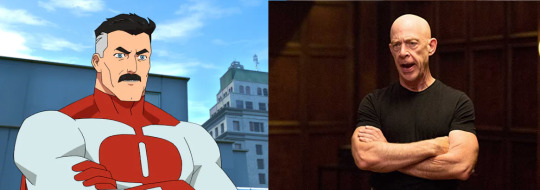
The Fletcher/Omni-Man parallel shows through their being incredibly harsh but extremely disciplined and principled, forcing people to become beyond even their own ideal selves (this via Omni-Man's tough-love teaching of Invincible �� comically, Omni-Man was actually psychologically easier on Invincible than Fletcher was on Whiplash's Andrew character). Despite the show's attempts to villainize Omni-Man, he, like Fletcher and also like Breaking Bad's Walter White, becomes progressively more awesome, eventually representing a Spartan will, an unconquerable drive, and a realistic and martial understanding of a hero's role.
To the show's credit, while it wrote Omni-Man to be outright genocidal and from a culture of eugenicists (again, Spartan), they could not help but admire him and his "violence" and "naked force" (for a Starship Troopers reference), giving him a path to redemption. That redemption comes in part because — despite the show's attempt to be often realistic and violent — its decision to be directed at young adults via dumb jokes, petty relationship drama, the characters’ reckless lack of anonymity and security in their neighborhood (loudly taking off and landing right at the doorstep), and light indy music also made the portrayed violence far less literal. With a less literal violence, the real statement becomes not that Omni-Man really did kill so many people (though he certainly did kill those people within the show's plot) but that he was symbolically capable of terrible violence but could be reformed for good. That's the shortcoming with putting violence under demographic limitations. If it's a PG-13 Godzilla knocking down cities, the deaths in the many fallen skyscrapers don't matter so much (the audience will even forgive Godzilla for mass death if it happens mostly in removed spectacle), whereas if it's Cormac McCarthy envisioning a very realistic fiction, every death rides the edge of true trauma.
By showing light between the real and the symbolic, it is much easier to identify and agree with Omni-Man. For instance, when Robot (voiced by Zachary Quinto of Heroes and the newer Star Trek movies)
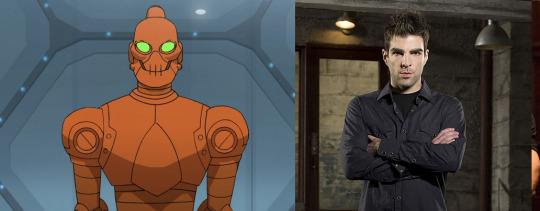
shows too much empathy for the revealed weakness of "Monster Girl" (voiced by Grey Griffin), the audience may have thought, "Pathetic," even before Omni-Man himself said it. And this because Omni-Man knows that true and powerful enemies (including himself) will not hesitate to use ultra-violence against these avenues of weakness. "Invincible" can make his Spider-Man quips while in lethal battles, but he does so while riding the edge of death — something that Omni-Man has to teach Invincible by riding him to the brink of his own.
Other Cast/Characters and Amazon's Hidden Budget It was impressive how many big-name actors were thrown into this — a true hemorrhage of producer funding. Amazon has so far hidden the budget numbers, perhaps because they don't want people to know that the show (like many of its shows) represents a kind of loss-leader to jump-start its entertainment brand.
Aside from those already mentioned, the show borrows a number of actors from The Walking Dead (WD), including.. • Chad L. Coleman ("Martian Man"; "Tyreese" on WD),

• Khary Payton ("Black Samson"; "Ezekiel" on WD),

• Ross Marquand (several characters; "Aaron" on WD)

• Lauren Cohan ("War Woman"; "Maggie" on WD)
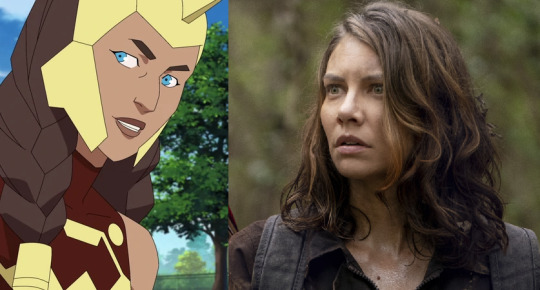
• Michael Cudlitz ("Red Rush"; "Abraham" on WD)
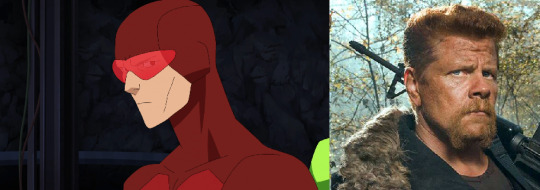
• Lennie James ("Darkwing"; "Morgan" on WD)
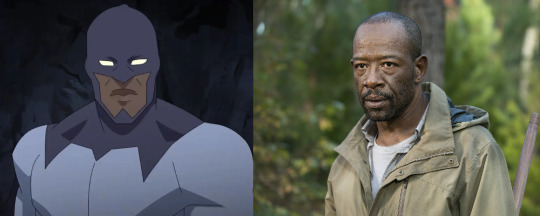
• Sonequa Martin-Green ("Green Ghost"; "Sasha" on WD)

There were also connections to Rick and Morty and Community, not just with Gillian Jacobs but also with... • Justin Roiland ("Doug Cheston"), who voices both Rick and Morty in Rick and Morty,

• Jason Mantzoukas ("Rex"),

• Walton Goggins ("Cecil"),
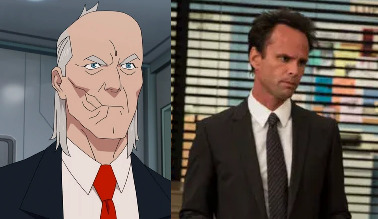
• Chris Diamantopoulos (several characters),

• Clancy Brown ("Damien Darkblood"),
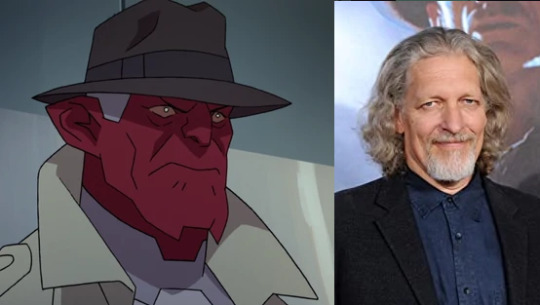
• Kevin Michael Richardson ("Mauler Twins"), and

• Ryan Ridley (writing)
That's a lot of overlap. They even had Michael Dorn from Star Trek: TNG (1987–1994) (there he played Worf) and Reginald VelJohnson from Family Matters (1989–1998) and Die Hard (1988), and even Mark Hamill. Pretty much everyone in the voice cast was significant and known. Maybe Amazon got a discount for COVID since the actors could all do voice-work from home? ;)
Overall Bad that it was for the Young Adult target demo but good for the infrequent adult themes and ultra-violence. Very high production value and a good watch for those who like dark superhero stories. I have heard that the comic gets progressively darker, which fits for Robert Kirkman, so it will likely be worth keeping up with this show.
24 notes
·
View notes
Text
What Makes a King? - A Concept Overview & Analysis
By: Peggy Sue Wood | @peggyseditorial
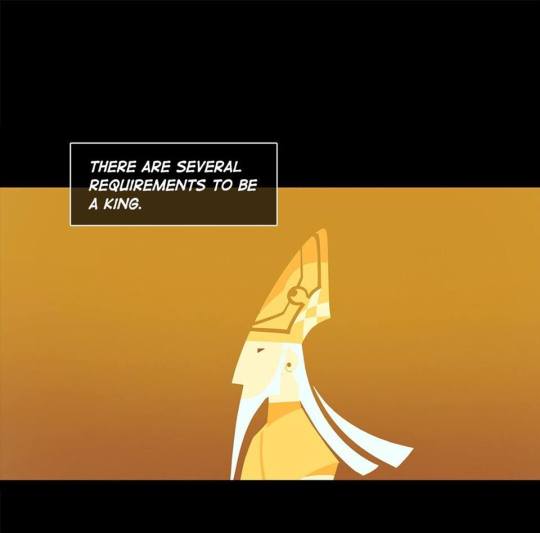
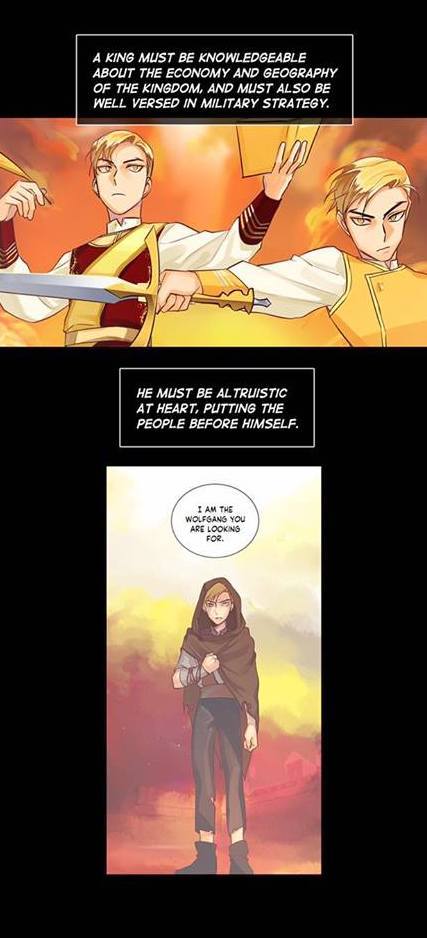
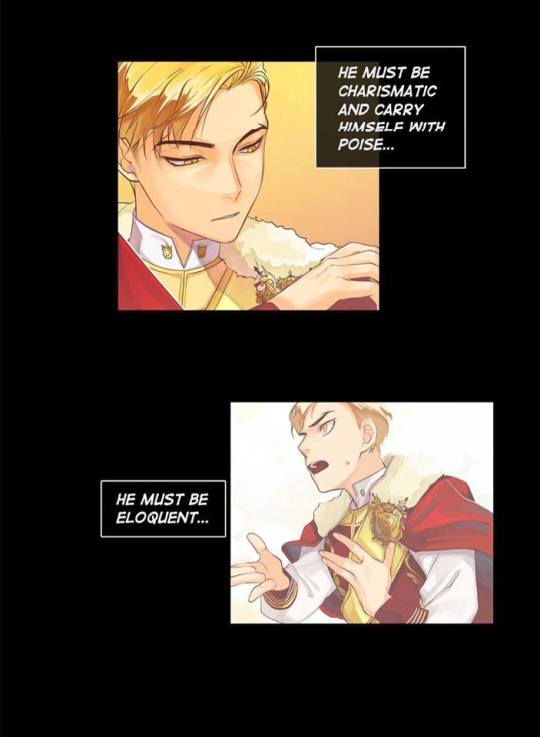




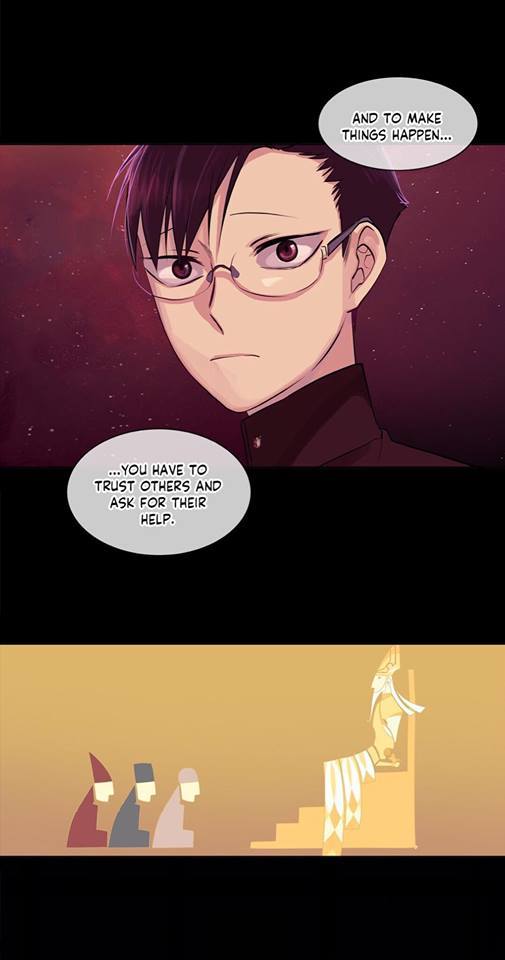
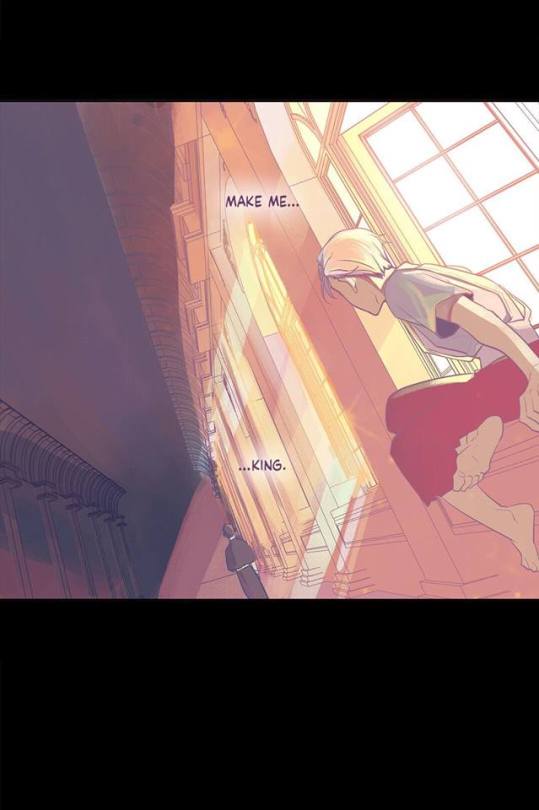
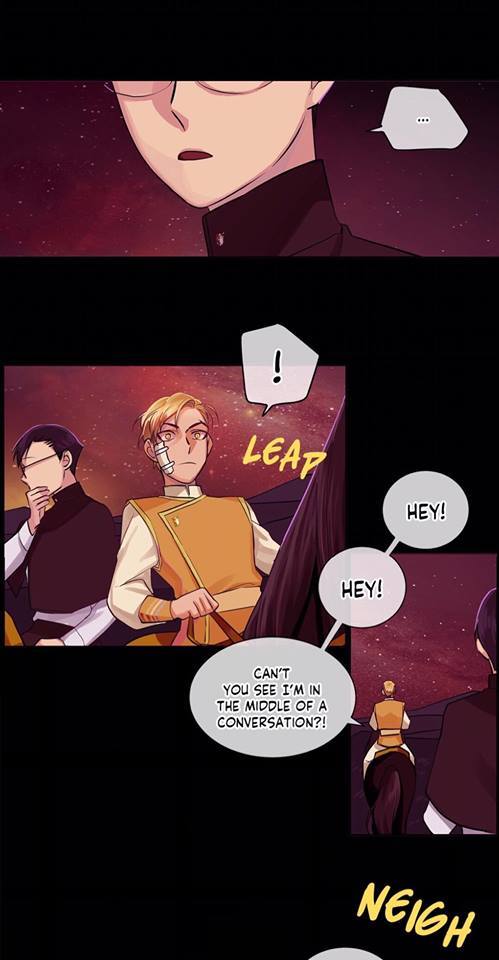
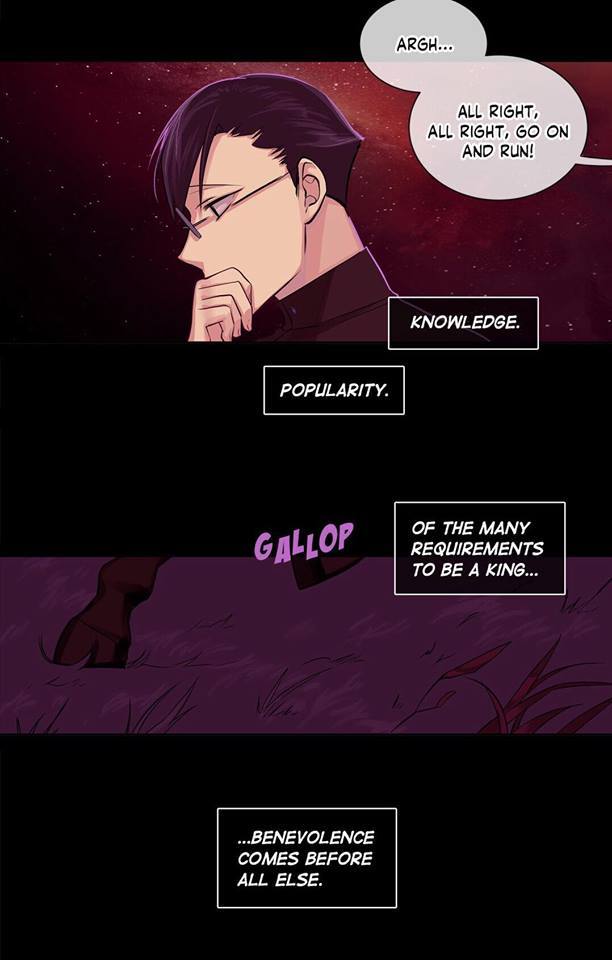

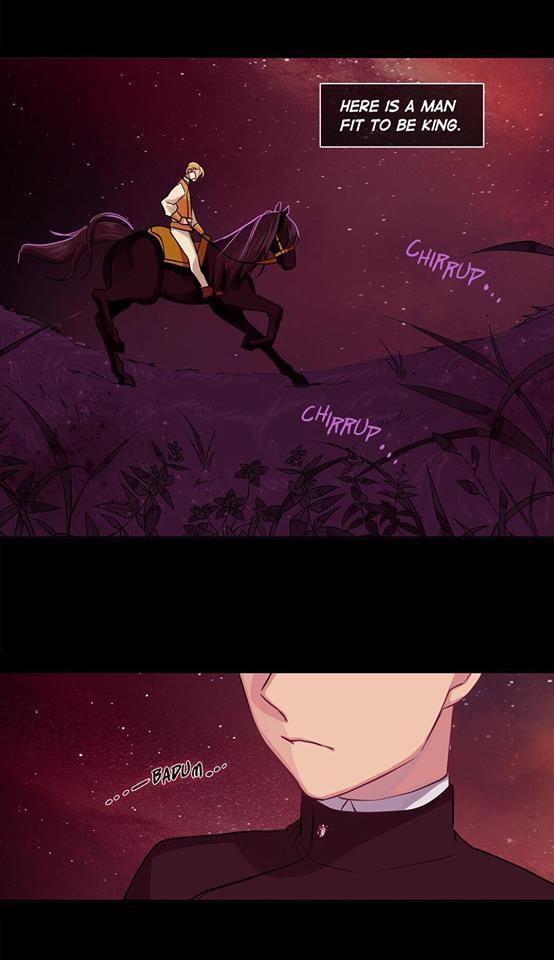

Above is my favorite scene from the manhwa King’s Maker (from Season 1 Episode/chapter 14).
I love this scene because it perfectly embodies the ideal of what it takes to be a just or good leader in the fictional world of this particular story (not just seen as one publicly, but actually being one). It's an idea that relies heavily on the concept of noblesse oblige, which tends to pop-up in stories featuring nobles, royalty, or something similar. While also expanding on this idea of the necessity for chivalry that draws its definition and history from stories of King Arthur and his Knights of the Round. In modern-day stories, I would argue that much of our current interpretations and ideas of knightly/chivalric qualities come from Geoffrey of Monmouth’s stories of the king and his knights as well as the tales’ later retellings. [For those that don’t know noblesse oblige is the idea of inferred responsibility from privileged people to act with generosity and nobility toward those less privileged and chivalry is defined as a knightly system with its religious, moral, and social code. Geoffrey of Monmouth is the author of the first narrative account of King Arthur's life that we know of.]
You see, as someone who has studied literature in school, particularly Classical Antiquity and where we've gone from since, I've always been really interested in this idea of what makes a King, particularly in stories where we see a fight for the throne because it's hard to maintain these ideal qualities in what is often a bloody battle for power among people who have little to no qualms about committing vile acts to maintain what they have or gain more power, money, etc. This question of what makes a King? is a one I find myself asking often when I read fantasy stories that involve any question of a throne or it’s inheritance. However, I use the term "king" loosely to encompass the concept of a rightful ruler as defined by the set up an author gives in their individual stories.
In popular works like Game of Thrones, in which we see much of the darker sides to knighthood, oaths, nobility, royalty, and so on--we see the grim reality of Geoffrey of Monmouth's time. In fact, some argue that Geoffrey's account and the focus on the knighthood and Arthur's reign amid war and beyond was a subversive aim to inspire real change among the dark abuses of power that many members of the knightly class, nobility, and above, held. In a movie like The Knight's Tale, we see this too in which it is the common man that depicts the embodiment of a true knight's spirit--one that is loyal, protective, chivalrous, deserving of love and admiration, and so on--rather than the majority of the knights born to their status. Shakespeare, who features many noble and royal families in his tales, also marks some of these qualities--showing audiences both redeeming features and cruelty among the classes (a rare depiction that landed him, at times, in the hot seat).
These stories draw me in, as they do many others, and I think we can draw a conclusion on the trials a good or just king, knight, noble, or other must embody to achieve their "throne" by the end--one that is a bit more clear than The King Maker's summary above.
Each potential "king" must succeed in a trail depicting one or more of the seven knightly virtues (defined here: http://marktoci.weebly.com/7-knightly-virtues.html), those being:
“Courage. More than bravado or bluster, a knight must have the courage of the heart necessary to undertake tasks which are difficult, tedious or unglamorous, and to graciously accept the sacrifices involved.
Justice. A knight holds him- or herself to the highest standard of behavior, and knows that “fudging” on the little rules weakens the fabric of society for everyone.
Mercy. Words and attitudes can be painful weapons, which is why a knight exercises mercy in his or her dealings with others, creating a sense of peace and community, rather than engendering hostility and antagonism.
Generosity. Sharing what’s valuable in life means not just giving away material goods, but also time, attention, wisdom and energy - the things that create a strong, rich and diverse community.
Faith. In the code of chivalry, “faith” means trust and integrity, and a knight is always faithful to his or her promises, no matter how big or small they may be.
Nobility. Although this word is sometimes confused with “entitlement” or “snobbishness,” in the code of chivalry it conveys the importance of upholding one’s convictions at all times, especially when no one else is watching.
Hope. More than just a safety net in times of tragedy, hope is present every day in a knight’s positive outlook and cheerful demeanor - the ‘shining armor’ that shields him or her, and inspires people all around.”
Suppose one were to look to the code of chivalry defined in Sir Gawain and the Green Knight. In that case, those virtuous qualities might instead be represented as friendship, generosity, chastity, courtesy, and piety/humility.
Failing to pass such trails, the potential "king" would instead display a knightly sin (defined here: https://chivalrytoday.com/knightly-sins/), and often, if not always, in a story suffers karma for such actions.
The idea of a Hero's Journey, a story form I'm sure everyone has heard defined many times before, includes these trails even though they are rarely explicitly spelled out in a summary of the form. This may be because many heroes rising, of which these "kings" are, already embody these virtues and only struggle with or require a trial against one of them.
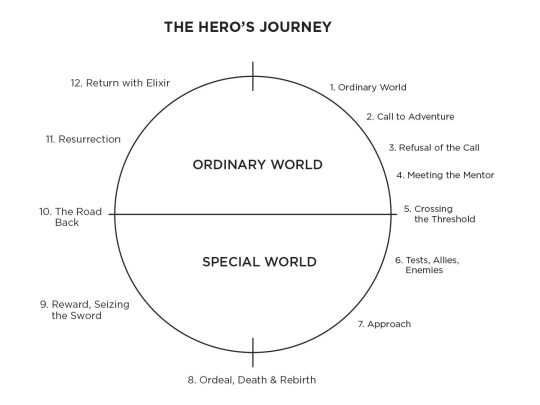
As it stands, we can often see in advance a potential king's tragedy by understanding this idea. For example, we know that Wolfgang Goldenleonard, the prince seen above in The King's Maker excerpt I’ve provided, is going to be the King, birth order be damned. Will there be trails? Of course. And he passes them securing his crown at the end of Season 1; and continues to pass them thus maintaining his throne, which we can see currently in Season 2.
By extension, we can see the character's whose stories will end in failure based on how long it takes them to pass the knightly trails, if they even can pass them. For example, Richard III in Requiem of the Rose King, which is sure to end in tragedy--not simply because the Shakespearean plays the work draws on tend to end that way but because Richard’s character has changed from the loyal son/brother.
King, in this sense, could probably easily be replaced by the word hero or knight... but the idea stands that to make them worthy of their title they seem to need one or more of these qualities.
So as you read the next chapter of your favorite knight's tale, or a battle for the throne, or a rise to power--consider whether or not your hero/protagonist is capable of achieving these virtues. You will probably find that even the characters that seem villainous, like the self-ish Seo Joo-Heon from Tomb Raider King or Naofumi Iwatani from The Rising of The Shield Hero, pass the test we've defined here.
#King’s Maker#킹스메이커#The Rising of The Shield Hero#rising of the shield hero#tomb raider king#king#king maker#kings#Requiem of the Rose King#Richard iii#shakespeare#king arthur#knight#knights of the round#knights#chivalry#code of honor#knight's code#Noblesse oblige#hero's journey#hero#heroes#journey#story#write#writing#game of thrones#a knight's tale#Geoffrey of Monmouth#Sir Gawain and the Green Knight
149 notes
·
View notes
Text
I think you should write a chapter where this special little Ella says 'Fuck you' to a genocide survivor in front of her privileged white royal peers.
And they are so disgusted with her selfish, crude, abusive behavior, normally kept secret, that they make a sport of mocking Ella's bad taste in fiction, truly the only thing Ella cares for. Ella clearly doesn't care about being beautiful or virtuous or well-liked hahahaha they chirp and laugh







Another moodboard for my favourite ship.
Modern AU- Painter Elia martell and journalist Arthur dayne .
154 notes
·
View notes
Text
Midwayers, and problems of intended belief
A discord conversation (at first about fae and spirits)
Me:
I feel so far behind on learning about fae and spirits and such. When I thought The Urantia Book was more than a well-intentioned hoax it was easy to think fae and such are all just what it calls "midwayers". Now I'm... wide open to new interpretations. I know I'm not behind, I'm just where I am, but still...
A:
I would love to give you more of an idea, but I don't know a ton about the Urantia book or what you mean by midwayers.
Me:
Oof, okay. I don't expect much in the way of answers, I know I'll get what I get in time. But I will take this opportunity to share.
In the Urantia Book, it make a lot of distinction between spirit and matter, as you might expect. Mind is the means by which Spirit rules over matter, yada yada. It also has a ton of details on angels.
There's a ton of history in there too, which I'm now interpreting as metaphor at best, because it's sure as shit not factual with its racial skeletal types and what not.
Anyway... Y'know, I'm gonna give the summary and then see if I have the energy for the story, because I'm worn out.
Basically, midwayers are midway between material and spiritual (but they're not, like, pure mind), covering the gap between angels and humans. They're native to the world, but descended from super-humans. They're immortal and stick around until the "age of light and life". And there's 1111 of either all of them or that might just be the first group of them.
Midwayers also get attributed cases of demonic possession (but so does mental illness), though they're not supposed to be able to do that anymore since Jesus completed his experience of life and earned his sovereignty (which was... before his public work) as basically god of local creation.
There's so much in this book and I carved it into my brain and now I don't trust it but it's still so quick to mind 😩
Innkeeper:
Woof okay I just read this
This is....so much not correct at all but also weirdly accurate
Which makes sense considering my personal theories on bleedthrough but thats another topic for another time
Me:
"Bleedthrough" sounds so very likely correct even without knowing what you mean exactly. That's pretty much my theory on how the Absolutes stuff seems so probably accurate despite everything else
A:
I'm just going to offer that whenever you hear "superhuman," in a spiritual tome, your hackles should probably raise.
Like, it sounds like this is coming from the same branch of angelic and Christian occultism that recognize the Nephilim, but uh, just be mindful that rhetoric about "ancient superhumans" is almost ALWAYS used to sell bullshit about magic indigenous people
It sounds like you're mindful of that, but, heads up
V:
The midwayer concept is ringing alarm bells between "Magic White People From Outer Space" to "Eugenics"
Innkeeper:
^
The idea of a liminal concept, something that exists in between those two states, I feel that holds water
The idea of literally everything else is uh
Worrisome at best
Me:
I'll add more in a sec but y'all right
Me (later):
To be clear, I was raised on the Urantia Book and am now moving away from it. For reasons mentioned above, among others.
It does come very close to "magic white people from outer space" and definitely is like "eugenics is a good idea but no one is qualified to direct it".
Me (replying to A):
Adding on, yes, but it's like... Fix-it fic. There's this spirit prince for the world who rebelled with Lucifer (who was like... a local administrator, not a god or angel), but when he arrived they like... called 100 natives [of Earth], cloned them with power-ups, and put people from other worlds like ours into the bodies who served as the prince's staff in the task of cultivating culture. Those staff, through essentially spiritual sex, created the first midwayers. After rebellion, the staff split and the ones who stay loyal to the prince are called nephilim and start a line of (acknowledged in the text) big ol' nasty racial supremacists. They're also called Nodites (c.f. "Land of Nod")
Later, Adam and Eve show up to "upstep" human evolution (disease resistance, humor, art... yeah, magic white people) but because the prince rebelled and shit's fucked, they're having a hard time. Eve bangs a local tribe leader to get an alliance and fucks everything up (that results in Cain. Able is Adam and Eve's next kid). So now should-be-immortal Adam and Eve only have a few hundred years to live and their (already many) kids get the choice to leave and most of them do.
A while later, their first son, Adamson, goes off to start a new cultural center, meets a woman named Rata who "claims" to be the last pure-line Nodite. [They] have a bunch of kids, every 4th of which is invisible(???), and they make those kids get together (yikes!) and that's where the secondary midwayers come from.
And it lampshades all this like "many things in the spiritual development of a world are hard to understand." Uh, yeah! History is weird, sure, but as it's fan fic, it's creepy.
A:
So, I'm saying this with all the love in my heart, but you can only portray things as fiction which are not intended to be believed.
That's not a fanfiction, that's a religious text. That is a religious text with a fully realized theology and metaphysics, complete with creation story. I think it is harmful to approach it as anything else, or as a "generic" metaphysical practice. (Relatedly, there is no such thing as "generic witchcraft," which is a main point of this history of the occult book club).
Doing a little bit more research, it's a religious text associated loosely with the Urantia Foundation and written in 1955. I'm not seeing any indication at the moment that there's a formal power structure associated with the movement, which lessens the chance for cult behavior.
What I will suggest to you is that you need to approach this work like you would any other religious text. Set aside questions of whether the text is "accurate" or "true." If you are honestly interested in the metaphysical, you should be able to separate empirical reality and history for the metaphysical. If you can't do that, take five steps back in your practice and come back once you can.
So, setting aside questions of truth, does this cosmology reflect the things you believe about the world? Does it encourage a way of thinking about people that you think is good, virtuous, honorable, etc? Can this text be used to uphold values that you hold, or do the natural extensions of this text lead to certain conclusions? Are those conclusions harmful?
For instance, I believe that eugenics is totally and morally abhorrent, and that there is fundamentally "no such thing" as a person who could pull it off "correctly." There's no way to do eugenics "right," just like I believe there is no morally correct way to, I don't know, punch a baby.
As such, even your acknowledgment that the text accepts eugenics makes it worthy of rejection in my mind.
Maybe you are interested and capable of doing the apologetics to make this into a compassionate religious movement. I don't know. I am not interested in doing that. But I do not think you can "move away" from this text, in the same way that you cannot "move away" from the bible, only from interpretations of it.
At some point, you have to believe in a basic assumption. If there's something that "feels right," there's only so far you can push it without that basic assumption.
If you think there is a separation between mind, body, and Spirit, wonderful. I would recommend you find another text and another basic set of assumptions. For instance, one that doesn't involve angels making angel-possesed magic native people for the point of preparing the world for the "good races."
Me:
Yes, you've got it right. Except that my interpretation has moved from "I think this book is what it claims" to "I think this was (probably well-intentioned, but still) a hoax perpetrated by ex-Seventh-Day Adventists". But for whatever good intentions may've been involved, the fact that it's intended to be believed makes it very harmful. I talked about it today as a way of saying "wow, look at this crazy shit" and talking through the changes involved in my different interpretation / loss of faith.
I don't believe in midwayers anymore and don't know what to believe, I'm trying to do the work, as you say, of finding what parts are good and what's harmful, comparing with empirical stuff, etc. But, however ready I may've been to walk away from the Urantia Book, it's still a process of recognizing what ideas I have based on it and examining them in turn to see what's salvageable.
Innkeeper:
I think that's an incredibly respectful way to go about it, Toph.
When something is that formative to you as a person, it's rarely as easy as learning it's harmful and then moving on, entirely separated from the source material. There's a long process of digging up every assumption you know you have--and many you don't know you have, or don't have at all--and needing to challenge them in a newer, healthier framework. One of the most potent aspects of the danger of cults is that they're incredibly difficult to challenge that base assumption, and it can take years if not a lifetime to walk a path that steadily heads away from what was taught.
So to acknowledge something formative's deep capacity for danger and harm, and go through the long process of picking it apart piece by piece to ensure you don't retain its harmfulness as you separate from it, I think that's the best possible way to go about something.
2 notes
·
View notes
Text
Macarthur: A Grim Portrayal of Philippine Poverty
⠀ ⠀ Written by Bob Ong, Macarthur is a novel that follows the lives of a group of friends who have to deal with their own flaws: Cyrus, Noel, Jim, and Voltron. Although he is known for his works themed after satire and humor, Bob Ong deviated from his usual formula to produce a novel depicting life in a Filipino slum community. The story opens with one of the main characters getting chased after stealing and swallowing an expensive necklace. He eventually gets caught by a corrupt policeman and is forced to defecate and hand over the stolen piece of jewelry. Macarthur can create very believable scenarios that everyone in the Philippines knows actually happen in real life. As a result, the novel is able to develop most of its cast of characters in a realistic way to show how miserable and tragic lives in the slums of the Philippines are.
⠀ ⠀ Education was one of the ideas contained in the novel. In particular, many mentions of education were from Cyrus or his grandfather, Mang Justo. When the four boys were at the fair, Cyrus asked his friends whether or not they wanted to turn their lives around, and uttered the following quote: “If I had finished my studies, I and Tatay [Mang Justo] would be rich now.”1 This dream for a proper education, along with something he had said earlier about building a business to buy a big TV and cook Tinola for his grandfather, showed that Cyrus had a will to turn his life around. Unfortunately, due to society, he had not been able to continue with this dream. It shows that many people are willing to change for the better, but they have no means.

⠀ ⠀ Later, when Noel and Mang Justo had a heart-to-heart talk about life, the topic of the discussion shifted to Noel’s education. At one point, Noel said that he wanted to return to school, but he did not know where to start. To this, Mang Justo responds: “You’ll only have to study for twenty years. You have to be able to endure that much, otherwise you’ll have to suffer for fifty years instead.”2 Having regret for himself and worry for the boy, he relayed this powerful analogy that emphasizes the importance of proper education. Overall, it can be seen that Mang Justo is a very empathetic man shown to have elder wisdom coming from his experiences in poverty and the successes of his children.
⠀ ⠀ Another theme that the novel tries to tackle is the idea of expectations. The characters in the novel are shown to have their own hopes and dreams. Through the eyes of the characters, we see how each of them struggles in order to achieve their goals. As previously mentioned, Cyrus and Noel had aspirations for their futures. Unfortunately, we see both of these characters’ aspirations come crashing down by the end of the novel due to the circumstances they have been exposed to. It shows the grim reality of the life of those who live in poverty. Jim can also be seen being affected by said circumstances. Due to poverty, he and his wife struggle to raise their child. One scene in the novel shows the two arguing with each other. Olive, Jim’s wife, was unsatisfied with the life they were living; Jim did not meet her expectations.3
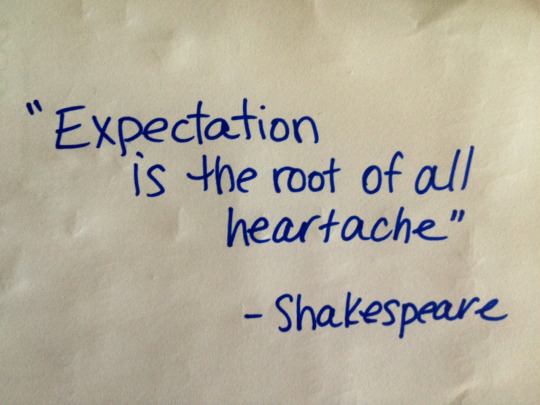
⠀ ⠀ Voltron is another example of failed expectations in the novel. His mother, Aling Seding, was said to have high expectations of him—a fact that was shown by the name his mother had given to him. His legal name, Amadeus, was never used to refer to him in the entire span of the novel. He was commonly referred to as either Voltron or Denver, Voltron being used by his close friends and Denver being used either by his mother or colleagues. The name Amadeus may actually refer to the famous composer Wolfgang Amadeus Mozart, who was a child prodigy. This name represents the expectations that Aling Seding once had when Voltron was younger. At one part of the story, Voltron, together with his friends and mother, were having a drinking session. While having their chat, Voltron’s mother happened to say a comment in passing. She called Voltron a punyeta (roughly translated to asshole), saying that she had put so much effort for him to go to school, disappointed at the fact that he dropped out.4 This being said, the only people who refer to Voltron as Denver were people who did not think that highly of him. Besides his mother, only his colleagues, who were implied to be doing illegal activities, were the ones who referred to him as Denver. These colleagues obviously do not think highly of him; it was implied that these people were responsible for Voltron’s death. If these people did actually respect Voltron, they would not have let him die. His third name, Voltron, is an obvious reference to the animated television show of the same name. Voltron (the character in the novel), was described to have a bumpy chest, a small head, and big limbs. His physical appearance is an allusion to the actual television character, having the same physical features. Though, the connection between the two characters does not only end with their physical appearance. The television character Voltron was also commonly referred to as “Defender of The Universe”. As seen in the novel, Voltron wanted to stay away from mischievous activities. After meeting with Edwin, he was described as not wanting to join said activities.5 He can also be seen abstaining from vices his friends do, even going to the point of trying to convince them to do the same.6 From a conversation between Cyrus and Voltron, it can also be seen that Voltron heavily disagrees with Cyrus’ sentiments on stealing. This being said, the parallels between the characters from the television show and the novel can be drawn. Voltron (in the novel) can also be described as the “Defender of the Universe”, the word “universe” referring to his friends. This shows his efforts of trying to protect his friends from bad influences.
⠀ ⠀ Other than education and dreams, poverty and addiction are also very prominent themes in the novel. Owing to poverty, the characters in the story face various problems. Being the eldest son and having a widowed mother, Voltron needs to stand for his other siblings. He needs to borrow money to meet the daily needs of the family and his youngest sibling. Another character, Jim, has an unstable income causing him to quarrel with Olive. In order to have a more decent life, the four main characters have tried to change towards a better path, but were unsuccessful in the end.

⠀ ⠀ Sometimes, people steal in order to survive. Due to the extremely uneven wealth distribution in modern society, people often steal to meet their basic needs such as food and clothing. Stealing seemed to be a daily routine of Cyrus’ life. He told Mang Justo that he has a job, but when Mang Justo asked him about which factory he was employed in, he paused for a few seconds before answering. The “work” he might be referring to is stealing. Although it is a white lie, it also revealed his deceitful behavior.
⠀ ⠀ Many issues arise from addiction as well. Cyrus consumes drugs which leads to the tragedy that happens near the end of the story. Again, Cyrus stole accessories from an ale. However, this time, he stole an accessory for the spendings of Mang Justo’s kidney transplant. Seeing Topak was almost near and reaching him, he went to the comfort room. Cyrus swallowed one of the accessories and kept the other one in his pocket. Then, he took the five packs of shabu from his pocket and consumed them one by one. From this it can be seen that Cyrus usually has drugs with him.
⠀ ⠀ In many cases, addiction is a kind of escape from reality or a short-term sense of security. Through smoking, drugs, drinking alcohol, games, the internet, and other forms of addiction, people get rid of worrying emotions temporarily. In the end, people fall into a brutal cycle and cannot get rid of their vices. Hence, their personality, lifestyles, and people around them will also be affected.
⠀ ⠀ The novel is a realistic portrayal of the life of lower-class Filipinos, revealing many social issues such as poverty, addiction, unemployment, and lack of education. The story showed the qualities, growth, and change of the characters. The four friends represent the young people in Philippine society, with virtuous innate qualities, but inadvertently led down the wrong path, tainted with bad vices. At the same time, they also want to escape from the vicious cycle of poverty, so they reflect on themselves and promise to reform themselves after realizing their mistakes. However, they do not let go of their vices because they think they can control their addiction. Things do not work out the way the friends thought they would, and the story ends as it does in the real world, where not all efforts are rewarded positively.
⠀ ⠀ Not only in the book, but these topics have always been social issues that have been brought up in reality. The author's intention in writing this story is not only to bring up these topics again, but also to warn readers to make every life choice wisely because even a small negligence can affect them. The story of the four friends is fictional, but the people in the real world have only one life to live.
Quote sources
Translated from Filipino. Original quote: “Kung nakapag-aral ako, mayaman kami dapat ngayon ni Tatay.” p. 45.
Translated from Filipino. Original quote: “Dalawang dekada ka lang mag-aaral. Kung di mo pagtitiyagaan, anak, limang dekada ng kahirapan ang kapalit.” p. 87.
“Kumakain tayo, Jim! Nagdadamit tayo. Nagkakasakit tayo. Kailangan natin ng legal na tubig at kuryente. Kailangan mo ng matinong trabaho. Kailangan ni Jon-Jon ng tatay. Kailangan ko ng asawa. Kailangan nating mabuhay! Ito na ba yung rurok ng mga pangarap mo, Jim? Hanggang dito ka na lang ba? Eto na ba yon lahat?!” pp. 37–38.
“Etong si Denver putangina ‘tong batang ‘to pinag-aaral ko dati, sa sabungan naman pala tumutuloy, kaya punyeta ka, sabi ko, huminto ka nalang, wala ka namang pakinabang!” p. 49.
Alam nya ang reputasyon ng kausap. Alam nyang nakakatulong ito sa mga handang magpatulong. At yun ang tanging katarantaduhan sa buhay na kinatatakutan nya ata hangga’t maaari ay gusto sanang iwasan.” p. 25.
“Tarugo kasi kayo, ayaw niyo tigilan mga bisyo nyo e,” p. 15.
Image sources:
Abee5
Malvika Neupane, Boost Thyself
Get Real Philippines
1 note
·
View note
Text
There is absolutely no question that women bond with men. From adolescence on, most females in our culture put enormous energy into heterosexual dating relationships, with the ultimate goal of finding a male mate. By college age, more women than men are both married and engaged to be married, and more are “in love, but not engaged.” More women than men report being in love. Although women and men begin dating at about the same age, women report that their first infatuation and their first love experience occur at younger ages. And college women report experiencing more intense feelings associated with love (for example, euphoria) than college males. Marriage to men is almost universal among women.
Rose (1985) says, “ Desire and its expression are embedded in a social context that defines what constitutes a romantic or erotic event” (p. 250). Rose points out that one source of cultural-romance scripts aimed primarily at women and girls is popular fiction such as certain fairy tales, contemporary romance novels, and gothic novels. The heroines in the fairy tales that are most commonly anthologized are typically attractive, virtuous, and passive. At the beginning of the story the heroine may be captive or trapped in an evil spell or trance. Initially, the prince/rescuer may appear in the disguise of a disgusting frog or a loathsome beast.
Thus, women are reminded to be open to every male suitor, no matter how inappropriate he may appear at first. Rose maintains that, though the manifest themes are nonsexual, the latent theme in fairy tales is the sexual awakening of the female by the male. This tells women that our sexuality is controlled by men and that relationships with males promise passion and eroticism. Rose contends that similar themes also appear in romance novels.
- Dee L. R. Graham, “Loving to Survive: Sexual Terror, Men’s Violence, and Women’s Lives”
The popularity of romance fiction is evident in its huge volume of sales to female readers. Ruggiero and Weston (1983) estimate that romance fiction accounts for 40 percent of paperback sales, suggesting that these novels appeal to a strong psychological need in women. Romantic fiction (like most well-known fairy tales) focuses on courtship and initiating relationships, or, put more precisely, creating heterosexual bonds between women and men. Rose (1985) notes that the males in romance novels are often initially described as “contemptuous or hostile to the heroine”. She further notes that “ readers are schooled overtly in the strange ability to completely reinterpret this behavior [so that] the hero’s cruel and boorish behavior is really a sign of his intense attraction”.
Similarly, Modleski (1980) notes that “male brutality comes to be seen as a manifestation, not of contempt, but of love” . By the end of the story, the female has conquered the originally aloof, brutal, cruel, and powerful male through “love.” Women may' be pulled to this type of fiction because it portrays the courtship period in male-female relation ships—an emotionally intense phase, and the only one in which women experience some (sexual, erotic) power over men. Romance novels “serve to reinforce stereotypes about women: love, sex, violence and dependency go hand in hand”. They also present the culture’s intermixing of gender, sex, violence, and dependency in a way that normalizes the brew and helps women feel better about it. After all, in the end it is all about love.
Is it possible that violence creates both high arousal and confusion in the victim? Does the victim interpret the high arousal as evidence of love rather than terror, because interpreting the feelings as love is less fear-producing than interpreting them as terror? Are the reported commitment and “love” cognitive distortions, such that violent relationships are perceived as more intimate than nonviolent ones?
Fairy tales and romance novels are prescriptions for pair bonding, but they give no blueprint for long-term relationships. Prescriptions for committed long-term relationships such as marriage are provided by experts (often male, or at least male-identified) who give women advice in “how to” books and women’s magazines.
Societal Stockholm Syndrome theory suggests that women are more likely to put men’s interests, feelings, and needs before our own when our survival is dependent upon men’s good will. The more dependent women are on men during any given period in history, the more likely we are to show these “selfless” behaviors. Whether the norms put forth in the magazines are traditional or liberal, the message that women are still responsible for the emotional climate of the relationship remains unchanged. The messages of these articles are simultaneously manipulative (they let women know what we must do to keep men happy) and reflective of women’s interests (women seek to know what we must do to keep men happy so women can survive). In addition, the messages in the articles expose the power or lack of power of women at a given time.
Other studies also indicate that, in considering dating and marriage partners, men attach greater importance to women’s physical attractiveness than women attach to men’s.
To summarize, the findings regarding love are consistent with Societal Stockholm Syndrome theory: men are more likely than women to initiate love; women are encouraged to remain psychologically and emotionally open to men of all types and are told, starting at a young age, that with love a grotesque frog will turn into a handsome, rich prince; men attach more importance to a woman’s physical attractiveness than vice versa; young women are more likely than men both to be in love and to be infatuated; the more one loves another, the less power one has in the relationship; in dating relationships, many women cognitively distort men’s violence, seeing it as a sign of love; the more violence women incur in dating relationships, the longer we are likely to stay in the relationship and the more love we are likely to report; and women are held responsible for the emotional climate of the relationship and for keeping the relationship together.
- (Kephart 1967), (Ruggiero and Weston 1983, p. 24), (Dion and Dion 1973), Dee L. R. Graham, “Loving to Survive: Sexual Terror, Men’s Violence, and Women’s Lives”
20 notes
·
View notes